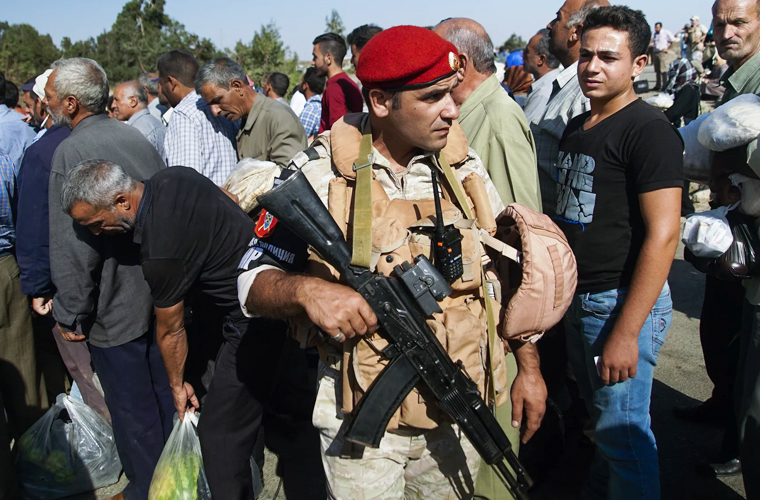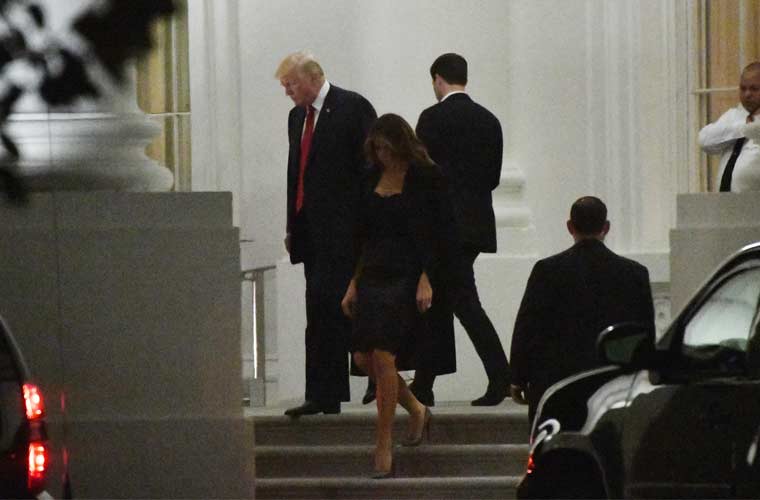Trending Now
- 830 voters names go missing in Kavundampalayam constituency
- If BJP comes to power we shall consider bringing back electoral bonds: Nirmala Sitaraman
- Monitoring at check posts between Kerala and TN intensified as bird flu gets virulent in Kerala
Around The Web
Moscow flaunts might against fading Isis as it alters balance of power in Syria
![]() September 15, 2017
September 15, 2017
Carefully orchestrated journalists tour reveals Russia’s deep involvement in conflict – but few ordinary Russians appear keen on Syrian mission
“I recommend you to look in that direction,” said Maj Gen Igor Konashenkov with a smile, gesturing at the Mediterranean waters from aboard the Admiral Essen naval frigate.
Moments later, two whooshes of noise and smoke heralded the launch of seven cruise missiles by two submarines from Russia’s Black Sea fleet.
The Kalibr missiles, each with a half-tonne payload, hit Islamic State targets to the south-east of Deir ez-Zor around midday on Thursday, roughly an hour after launch, Konashenkov said. The town is a key strategic outpost in eastern Syria, where the Islamist fighters are in retreat. Opposition activists later said that at least 39 civilians were killed in airstrikes by Russian and US-backed coalition forces across the country.
Viewing the missile launch was the latest element of a tour for a group of Russian and foreign journalists, including the Guardian, of Russian activities in Syria, designed to show that Moscow is in control of both war and the peace in the country.
Each element of the trip has been shrouded in secrecy until it happens, with buses and transport planes boarded to unknown locations and an overnight journey by ship into the Mediterranean with no indication of what to expect.
The tour began with an overnight flight from a military airfield outside Moscow to the Khmeimim airbase near the coastal city of Latakia, where the Russian air force has been based since intervening in the conflict on the side of president Bashar al-Assad’s government in September 2015.
The trip has shown just how involved in the conflict Russia has become. It has taken place under the watchful eye of Konashenkov, the army’s main spokesman, who with his frequent televised briefings has become the face of Russia’s operations in Syria. Unlike his deadpan delivery on the podium, Konashenkov cuts a more colourful figure when on the road, littering his speech with metaphors and delivering long rants on journalistic ethics and western hypocrisy to correspondents, while puffing on slim cigarettes.
Suggestions of civilian casualties are dismissed as “political” and any suggestion that Russian and Syrian airstrikes have been indiscriminate is dismissed out of hand. Awkward questions are not encouraged during briefings.
In Aleppo, reached on Tuesday by a Soviet-era Antonov transport plane that descended at a hair-raising angle into the city’s airfield to evade anti-aircraft fire from the ground, a series of carefully choreographed stop-offs appeared designed to showcase Russia’s role in rebuilding the city.
Large swathes of eastern Aleppo – parts of which were under rebel control until the end of last year – are still almost entirely deserted and in ruins, but reconstruction work has begun in parts of the city. At the central Saadallah al-Jabiri Square, which had been close to the front lines, workers laid new paving stones this week and a huge portrait of Assad now dominates the square.
At a school in the western part of the city, which remained in government hands throughout the fighting and was hit by a rebel rocket attack during the war, schoolchildren were singing patriotic songs as the journalists’ arrived and teachers relayed gratitude for Russian aid through Russian military translators.
At a later stop at the city’s Umayyad mosque, dating back to 715 and badly damaged during the war, the mufti of Aleppo, Mahmoud Akkam, was similarly on-message.
Akkam thanked Ramzan Kadyrov, the controversial Kremlin-backed leader of Chechnya, for a donation of $14m (£10.5m) to help rebuild the mosque and denied that any of the devastation to the mosque or the surrounding neighbourhoods was caused by Russian or Syrian government airstrikes. “It was all the terrorists,” he said. This was the line whenever ruins and devastation were encountered on the trip.
The next day the Russians showed off a mine removal centre outside Homs, where eight instructors flown in from Russia are giving hundreds of Syrian army recruits six-week crash courses in de-mining before they are sent into the field as sappers.
There was also a visit to one of four “de-escalation zones”, north of Homs, where a checkpoint has been set up to allow civilians to cross between government territory and areas controlled by the Free Syrian Army, moderate rebels.
Four of the zones were set up after talks in the Kazakh capital, Astana, in May. Russia, Turkey and Iran are the guarantors of agreements made there and Russian military police are guarding the checkpoint. Wearing red berets and traveling in new Tigr armoured vehicles with Russian and Arabic markings, the military police are playing a highly visible role on the ground.
Alexander Sazonov, the Russian officer in charge of the Homs de-escalation zone, said the Russians carry out regular communication with the opposition groups via Skype, and said there had been no major incidents in the two months since the crossing point had been set up. As the journalists arrived, four Russian trucks with humanitarian aid drove up right on cue, and the Russians doled out shiny plastic bags filled with basic foodstuffs and bearing a message in Russian and Arabic: “Russia is with you.”
As well as its on-the-ground peacekeeping role, Russia is still heavily engaged in air cover for Syrian and Iranian ground troops. Lieutenant general Alexander Lapin, the head of the Russian contingent in Syria, said Russian airstrikes had helped Syrian troops to break the three-year Isis siege around Deir ez-Zor last week, adding that only 15% of Syrian territory remains under the control of extremist Islamist groups.
“The operation to destroy the fighters of the Isis and Jabhat al-Nusra terrorist groups on Syrian territory will continue until their complete and guaranteed destruction,” he said.
The Syria intervention has undoubtedly made Russia a major player in the Middle East and western demands that Assad step down have now largely been muted due to the new reality on the ground.
“On the surface, Russia’s Syrian adventure has been an unexpected success. The cost is relatively limited, and offset by the opportunity to use it as a marketing event for Russian weaponry,” said Mark Galeotti, senior researcher at the Institute of International Relations Prague.
The Syrian war has also been portrayed as Russia’s return to the global stage as a major player. Thursday’s missile launch was quickly relayed by the Russian journalists on board and published by Tass news agency to a hard rock soundtrack.
But the Syrian operation has failed to capture the imagination of ordinary Russians. A poll by the independent Levada Centre in early September found that just 30% of Russians wanted the military operation in Syria to continue.
Moscow “is essentially now locked in a war with no end in sight,” said Galeotti, as even the total defeat of Isis is unlikely to bring lasting peace to Syria.
For Konashenkov, the goal of the operation is to make Syria “a civilised, secular society” and he said the operation had been an important learning curve for the Russians. “The experience we’ve had in Syria has been absolutely invaluable for us,” he said. “We are at a completely different level now than we were just a few years ago. It is difference between a pencil and a pen – we still perform the same functions but everything is more beautiful, more reliable and more effective.”
























